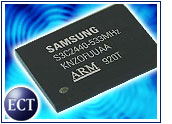
Korean electronics giant Samsung has announced a new mobile processor with a clock speed of 533 MHz. The company called the new processor the “world’s fastest mobile CPU” and promised it will offer new functions and services for mobile phones and PDAs.
Samsung said the new mobile processor, designed for improved handheld performance and power efficiency, will be mass produced beginning in the fourth quarter of this year.
Aberdeen Group chief research officer Peter Kastner told TechNewsWorld that the new CPU will speed and enhance handheld functions, such as encrypting e-mail and compressing digital images. However, he said, Samsung might have difficulty getting the new processor into phones and PDAs other than its own.
“Breaking into this market is fairly difficult,” Kastner said.
Faster for Features
Samsung claimed its new CPU, called the S3C2440, will drive the emergence of new services, functions and multimedia content for mobile handheld devices.
The company said the S3C2440 will enable end-user features, such as camera interfaces, LCD displays, USB connections and touch-screen capabilities.
Featuring Samsung’s ARM92OT core, the new CPU is a 32-bit RISC microprocessor designed for high performance in a small form factor. The CPU draws only 1.3 volts of power.
Developed using the .13-micron manufacturing process, the S3C2440 adopts the new Advanced Microcontroller Bus Architecture, an open bus specification that details a strategy for the interconnection and management of functional blocks on a processor.
Samsung said the CPU will support major operating systems, including Microsoft Windows CE, Palm OS, Symbian and Linux.
With a core speed of as high as 533 MHz, the mobile CPU is faster than the comparable XScale processor from Intel, which tops out at 400 MHz. Samsung said it is now sampling the CPU in 533-MHz, 400-MHz and 300-MHz versions.
Beyond the Clock
Yankee Group analyst John Jackson told TechNewsWorld that Samsung’s new CPU is the fastest mobile processor to date, but he added that microprocessing power is only one of many critical factors in powering small devices.
“This advanced microprocessing speed coupled with other efficiencies in the architecture, such as power management and access to memory subsystems – these are sort of the benchmarks handset manufacturers are striving for,” Jackson said. “Still, microprocessing power isn’t everything.”
He noted that a debate is taking shape in the handset industry over the need for a dedicated applications processor, such as Samsung’s S3C2440, versus the use of more robust digital signal processing (DSP) technology.
Reducing Costs
Designed to offer high performance without consuming a lot of power, Samsung said the new CPU also offers a built-in flash-based boot loader to let manufacturers use high-density flash memory without the need for additional support chips. The company claims this technique can help reduce costs for device makers that will not have to configure additional components.
“By providing a set of common system peripherals, the S3C2440 reduces overall system costs and eliminates the need to configure additional components,” Samsung said in a statement.
The Yankee Group’s Jackson called the built-in flash feature “critical,” referring to cost efficiencies and density advantages.
Faster Not Enough
Although he pointed to improved performance from the new Samsung CPU in mobile phones and other handheld devices, Aberdeen’s Kastner said Samsung might have difficulty breaking into the mobile processor market.
He noted that with proprietary architectures from the likes of Nokia and several device makers already committed to Intel’s XScale processor, Samsung might not be able to move the new CPU beyond its own devices.
“While Samsung can use these processors in its own telephones, breaking into the 400-million-unit-per-year mobile business takes more than a fast processor,” Kastner said.





















































